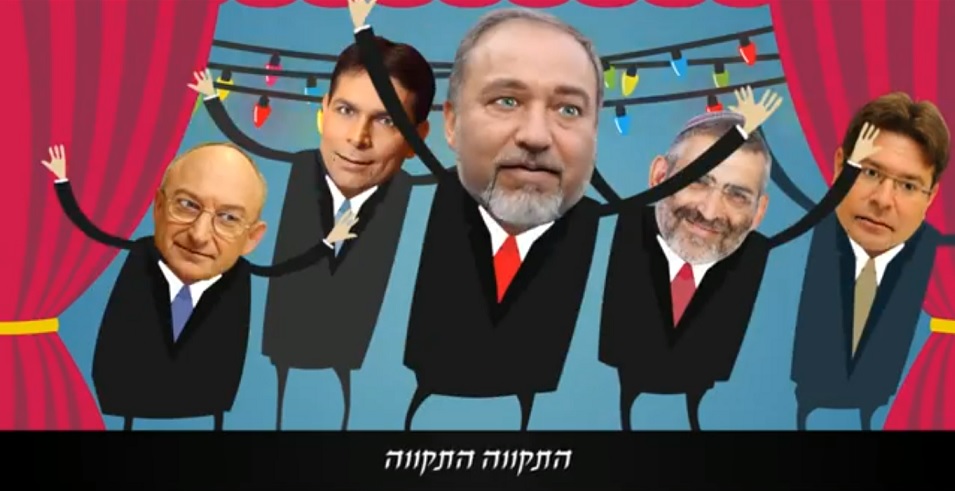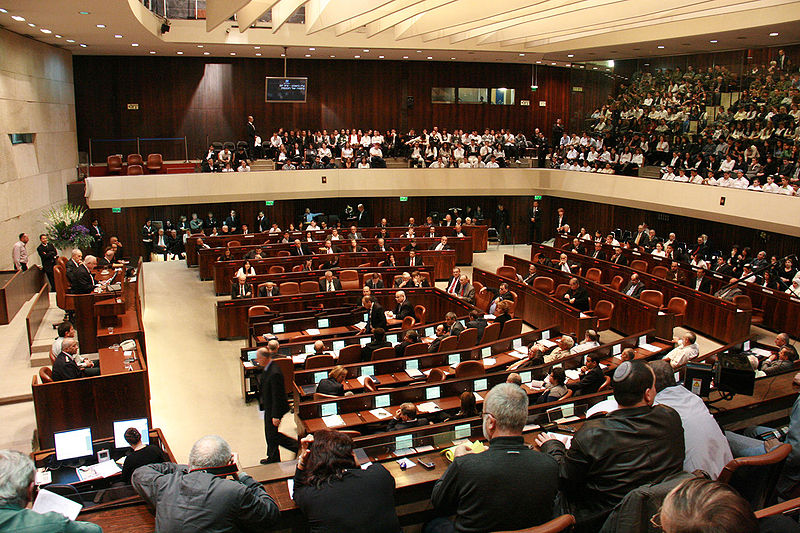The State of Israel v. MK Dr. Azmi Bishara
Case Summary | Syria Visits Case | Political Speeches Case | Documents | Biography of MK Dr. Azmi Bishara
Case Summary
On 7 November 2001, the Israeli Knesset (parliament) voted to lift the immunity of Member of Knesset (MK) Dr. Azmi Bishara, head of the National Democratic Assembly party. This move came at the request of Attorney General Elyakim Rubenstein, in order to initiate two criminal prosecutions against MK Bishara: charges pursuant to the Emergency Regulations (Foreign Travel) (1948) and Prevention of Terrorism Ordinance (1948).
The removal of MK Dr. Bishara's immunity is an unprecedented event in the history of Israeli politics. It is the first time that an MK has been stripped of his immunity because of political statements made in the course of performing his duties as a public representative.
(1) Syria Visits Case:
MK Bishara and two of his parliamentary assistants were charged under Article 18(d) of the Emergency Regulations (Foreign Travel) - 1948 for organizing a series of visits for elderly Palestinian citizens of Israel to travel to Syria to visit refugee relatives they had not seen since 1948. Adalah represented MK Bishara and his parliamentary aides before a three-judge panel in the Magistrate Court in Natzeret Illit.
After oral hearings and the filing of numerous written briefs, in 4/03, the Court unanimously decided to dismiss the indictment against MK Bishara, accepting Adalah's argument that Article 17(c) of the Emergency Regulations exempts MKs from prosecution for this offense.
In 12/05, the Magistrate Court ruled to not convict MK Bishara's former parliamentary assistants, Mr. Mousa Diab and Mr. Ashraf Qurtam of the criminal charges against them. In lieu of conviction, the Court sentenced Mr. Diab and Mr. Qurtam to a symbolic punishment of 200-300 hours of community service. Press Release - 4 January 2006
(2) Political Speeches Case:
MK Bishara was charged with two counts of allegedly "supporting a terrorist organization," namely Hezbollah, based on political speeches he made, in violation of sections 4(a), 4(b) and 4(g) of the Prevention of Terrorism Ordinance - 1948. In these public speeches, made in Umm al-Fahem, Israel on 5 June 2000 and at a memorial assembly in Syria on 10 June 2001, MK Bishara analyzed the factors that led to the end of the Israeli occupation of South Lebanon and spoke about the realities of the continued Israeli occupation of the Palestinian territories.
According to the Attorney General:
- MK Bishara's speeches were not legitimate expressions of political opinions, but a call to adopt terrorist methods against Israeli citizens and the Israeli government, in order to alter government policies;
- parliamentary immunity was not intended to protect MKs who make such speeches and therefore it was correct for MK Bishara's immunity to be lifted;
- the Magistrate Court does not have the jurisdiction to rule on the legality of removing MK Bishara's immunity by the Knesset.
In 11/03, after numerous hearings and written submissions, the Magistrate Court ruled not to dismiss the indictment against MK Bishara. The Court stated that there is no need to decide on MK Bishara's preliminary arguments regarding his parliamentary immunity, among other issues, at this stage they related to "factual questions, which belong in the main part of the case and not within the framework of preliminary arguments." The Court also determined that "the aforementioned arguments have no place in the preliminary stage but rather following the hearing the evidence of the case," and further stated that, "detailed reasons will be given as necessary in the body of the verdict, which will be provided hereafter." Read more on the Magistrate Court decision
Adalah filed a petition against the Attorney General, the Knesset, and the Magistrate Court to the Supreme Court in 12/03, challenging the Magistrate Court's decision on MK Bishara's behalf. The petition was filed along with a motion to stay the proceedings in the Magistrate Court pending a final outcome of the case. The petition seeks a ruling by the Supreme Court on the issue of immunity. Specifically, the petition demands that:
(i) the Knesset cancel its November 2001 decision to revoke MK Bishara's immunity from prosecution;
(ii) the Attorney General cancel the indictment; and
(iii) the Magistrate Court stop all criminal proceedings as long as no final decision has been made on the status of MK Bishara's parliamentary immunity.
In 11/04, the Supreme Court held a first hearing on the petition, at which the Court determined, as Adalah had argued, that the issue of MK Bishara's immunity must be resolved pre-trial. The Court suggested that the AG should choose one of two tracks: either the case should be sent back to the Magistrate Court to decide on the status of MK Bishara's parliamentary immunity, or the Supreme Court will hold hearings and give the final decision on this issue. The Court granted the AG's request of 30 days to prepare its written response. Press Release - Newsletter, November 2004
According to a decision of the Inter-Parliamentary Union's (IPU) Committee on the Human Rights of Parliamentarians issued in 1/05 in MK Bishara's case, "Deciding upon the question of immunity at the end of a trial is legal absurdity, as it wholly defeats the purpose of immunity." The IPU is an international organization of 130 national parliaments worldwide, including Israel's Knesset.
In 2/05, the AG's representative informed Adalah that the AG decided that the Supreme Court is the appropriate venue for deciding on this matter.
In 2/06, the Supreme Court ruled that the speeches made by MK Bishara fell were protected under his parliamentary immunity and dismissed all criminal charges against him. Press Release - 14 February 2012
Case citation: H.C. 11225/03, MK Azmi Bishara, et al. v. The Attorney General, et al.
Documents
Prevention of Terrorism Ordinance, Emergency Regulations (Foreign Travel) and Prevention of Infiltration (Offences and Jurisdiction) (Amendment) Law Law in English - Law in Arabic
Decision of Nazareth Magistrate Court Dismissing Indictment against MK Bishara in Connection with Visits to Syria (Hebrew) - 1 April 2003.
Decision of Nazareth Magistrate Court Not Dismissing Indictment against MK Bishara for Political Speeches Decision (Hebrew) -12 November 2003.
Adalah's Statement on the Cases
Statement in Arabic
Statement to the Inter-Parliamentary Union's Committee on Human Rights of Parliamentarians: The Case of MK Dr. Azmi Bishara by Adalah Attorney Jamil Dakwar
Biography of MK Dr. Azmi Bishara
Member of Knesset (MK) Dr. Azmi Bishara holds a doctorate in philosophy, which he received from Humboldt University in Germany in 1986. His Ph.D. dissertation is entitled Methodology in the Kapital of Karl Marx: The Myth of the Unity between the Logical and the Historical. Prior to being elected to the Israeli Parliament (the Knesset) in 1996, Dr. Bishara taught at Bir Zeit University for ten years and headed the Philosophy and Cultural Studies Department during the years 1990-92. He is one of the principal founders of Muwatin – The Palestinian Institute for the Research of Democracy, and a social sciences journal, Theory and Criticism, founded together with Israeli colleagues. He has also worked as a senior researcher at the Van Leer Institute in Jerusalem.
Dr. Bishara has written several books and numerous articles on democracy, civil society and Middle East politics. Among his books are A Contribution to the Critique of Civil Society and The Fragmented Political Discourse and Other Studies.
Dr. Bishara was a key founder of the political party that he represents in the Knesset, the National Democratic Assembly (NDA-Balad). He is a frequent speaker at international conferences regarding the Palestinian question.
Web links to selected writings of MK Dr. Azmi Bishara:
“Mythical transformations” (Al-Ahram, 25 October 2001)
“When narratives collide” (Al-Ahram, 20 September 2001)
“Israeli-Arabs: reading a fragmented political discourse” (Al-Ahram, 1998)
“Exhausting the dream” (Al-Ahram, 30 April 1998)















